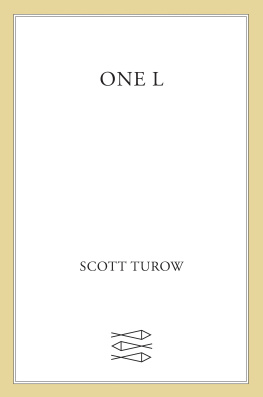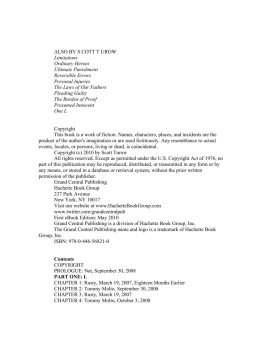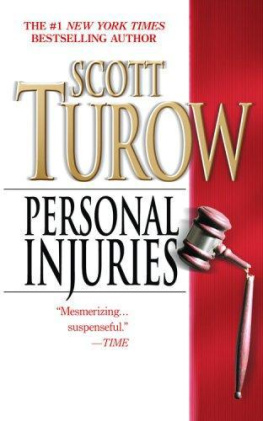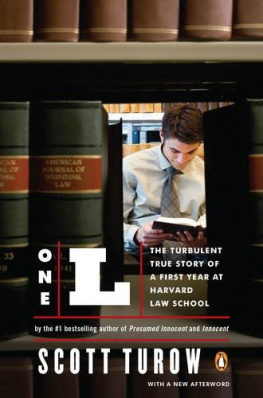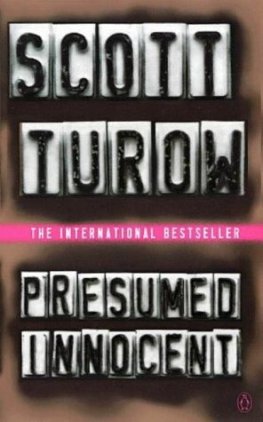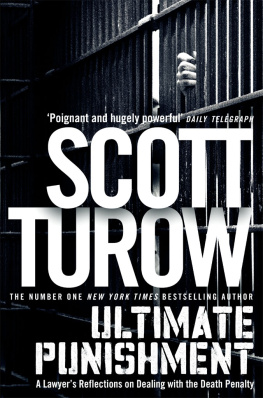
11/17/75
It is Monday morning, and when I walk into the central building I can feel my stomach clench. For the next five days I will assume that I am somewhat less intelligent than anyone around me. At most moments Ill suspect that the privilege I enjoy was conferred as some kind of peculiar hoax. I will be certain that no matter what I do, I will not do it well enough; and when I fail, I know that I will burn with shame. By Friday my nerves will be so brittle from sleeplessness and pressure and intellectual fatigue that I will not be certain I can make it through the day. After years off, I have begun to smoke cigarettes again; lately, I seem to be drinking a little every night. I do not have the time to read a novel or a magazine, and I am so far removed from the news of world events that I often feel as if Ive fallen off the dark side of the planet. I am distracted at most times and have difficulty keeping up a conversation, even with my wife. At random instants, I am likely to be stricken with acute feelings of panic, depression, indefinite need, and the pep talks and irony I practice on myself only seem to make it worse.
I am a law student in my first year at the law, and there are many moments when I am simply a mess.
Preface
In baseball its the rookie year. In the navy it is boot camp. In many walks of life there is a similar time of trial and initiation, a period when newcomers are forced to be the victims of their own ineptness and when they must somehow master the basic skills of the profession in order to survive.
For someone who wants to be a lawyer, that proving time is the first year of law school. There are many obstacles to becoming a successful attorney. Getting into law school these days is far from easy. And following graduation three years later, you must pass the bar exam in your state, find a job, or set out on your own, build and maintain a practice. Yet none of those steps is thought to possess the kind of wholesale drama of the first year of law school. Not only is it a demanding yearthe work hugely difficult and seemingly endless, the classroom competition often fiercebut it is also a time when law students typically feel a stunning array of changes taking place within themselves. It is during the first year that you learn to read a case, to frame a legal argument, to distinguish between seemingly indistinguishable ideas; then that you begin to absorb the mysterious language of the law, full of words like estoppel and replevin . It is during the first year, according to a saying, that you learn to think like a lawyer, to develop the habits of mind and world perspective that will stay with you throughout your career. And thus it is during the first year that many law students come to feel, sometimes with deep regret, that they are becoming persons strangely different from the ones who arrived at law school in the fall.
This book is about my first year as a student at the Harvard Law School in Cambridge, Massachusetts. The fact that the years events took place at Harvardthe oldest, largest, and perhaps most esteemed of Americas law schoolsdoes not in the end differentiate my experience much from that of the nearly 40,000 Americans who begin their legal education every fall. The first year at American law schools tends to be remarkably uniform. The course of study has changed little in the past century. Almost every first-year student is required (as I was) to take what are generally thought of as the basic subjectsthe law of Contracts, Torts, and Property, the Criminal Law, Civil Procedure. Nor does the manner of instruction vary much from place to place. Study focuses on selected court cases from which students are expected to deduce legal principles, and the classes are usually conducted by the so-called Socratic method, in which individual students are interrogated at length about their impressions of the material. These days, students at all law schools are usually bright and accomplished, and the struggle for jobs in the future and for first-year honors leads at most schools to the same emphasis on grades and the same atmosphere of tension, competition and uncertainty in which I found myself during the past year at Harvard. For all of us who have made it through the first year, I am sure that it was a similar undertaking, overwhelming, sometimes frightening, always dizzyingly intense.
In writing this book, I have sought to show that intensity, and the process of change, as they made themselves felt day by day upon my classmates and me. I kept a journal throughout the year and often Ive taken passages directly from it when my thoughts and feelings seemed especially clear and important. For the most part, however, Ive attempted to shape those reflections in light of the experience of the complete year and the knowledge that first impressions did not always prove an especially reliable indicator of either the way things would turn out, or even the general course of my feelings.
This book is one persons perspective on an experience that is viewed in widely varying ways. I make no claims that any of my reactions are universal. And it is also a book, written as soon as the year had concluded, which has little of the mellowing of time. No doubt, I would write a different book ten years from now, emphasizing different events, expressing more or less concern about certain elements of my education. For better or for worse, I have tried in the immediate aftermath of that demanding, rewarding, turbulent year to produce a coherent account of what it feels like to go through it. I have written in the belief that the law, like any other field, is little more than the people who live it, and that lawyersas well as the law they make and practiceare significantly affected by the way they were first received into the profession. If I am right about that, then the first-year experience should be of interest to everyone, for it bears on the law that bounds and guides our whole society.
I should add two special notes.
First, this book is not a novel. Everything I describe in the following pages happened to me. But the people about whom I speak are not the same as the friends and professors with whom I spent the year. I have combined and altered personalities in order to represent more adequately the general character of my experience. And because the people around me did not know that I would undertake this project, I have changed names, backgrounds, and sometime other details, to avoid any potential sacrifice of their privacy.
Finally, I should say once, forthrightly, that I am proud to be a student at Harvard Law School (HLS is the abbreviation Ill often use). Im sure that much of this book bespeaks that pride, but I make this declaration in order to insure that my occasional criticism of HLS will not be misunderstood. Since its founding in 1817, through its graduates and as a scholarly resource, the Harvard Law School has had an extraordinary impact on the growth and enrichment of the American law and the American legal profession. I am glad to be among the inheritors of its traditions. That both the law and HLS can be made richer, more humane, more just institutions is more than a personal assumptionit is an institutional one as well, an idea taught and reinforced at HLS. It is ultimately out of the belief in reasoned change, for which the law school in many ways stands, that any criticism grows.

